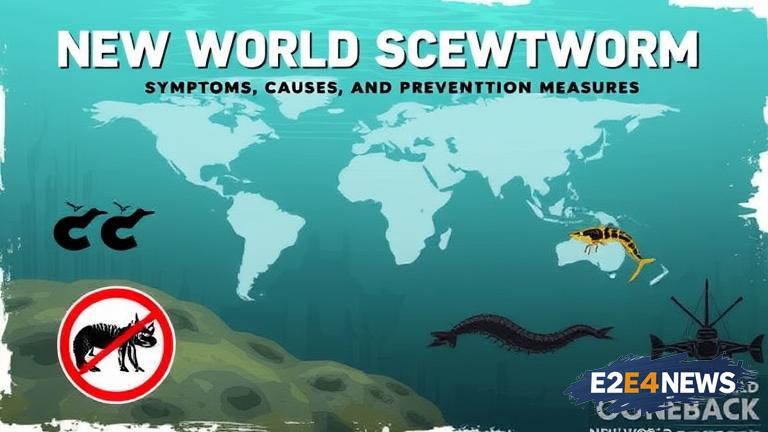The New World Screwworm, also known as Cochliomyia hominivorax, is a parasitic infestation that has been reported in the United States, primarily affecting animals such as livestock and pets. The screwworm is a type of fly that lays its eggs in the wounds of animals, which then hatch into larvae that feed on the animal’s flesh. The infestation can cause severe damage to the animal’s tissue, leading to infection, organ failure, and even death. The symptoms of New World Screwworm infestation in animals include wound lesions, swelling, and discharge, as well as behavioral changes such as lethargy and loss of appetite. In severe cases, the infestation can lead to sepsis, organ failure, and death. Humans can also be affected by the New World Screwworm, although this is rare. The symptoms of infestation in humans include wound lesions, swelling, and discharge, as well as fever, chills, and headache. The causes of New World Screwworm infestation include poor animal husbandry practices, inadequate wound care, and the presence of the screwworm fly in the environment. Prevention measures include proper wound care, use of insecticides, and vaccination of animals. It is essential to report any suspected cases of New World Screwworm infestation to the authorities to prevent the spread of the disease. The US Department of Agriculture (USDA) has implemented measures to control the spread of the disease, including quarantine and vaccination programs. Animal owners are advised to take precautions to prevent the infestation, including inspecting their animals regularly for signs of infestation and seeking veterinary care immediately if they suspect an infestation. The New World Screwworm infestation has significant economic and social implications, including the loss of livestock and the impact on animal welfare. The disease has also raised concerns about the potential for human infestation, highlighting the need for increased awareness and education about the disease. The USDA has warned that the New World Screwworm infestation could have devastating consequences if left unchecked, including the loss of entire herds of livestock. The agency has urged animal owners to take immediate action to prevent the spread of the disease, including reporting any suspected cases to the authorities. In addition to the USDA, other organizations such as the Centers for Disease Control and Prevention (CDC) and the World Health Organization (WHO) are also working to control the spread of the disease. The New World Screwworm infestation has also highlighted the need for increased funding for animal health programs, including research and development of new treatments and vaccines. The disease has also raised concerns about the potential for bioterrorism, highlighting the need for increased security measures to prevent the intentional release of the screwworm fly. The New World Screwworm infestation is a significant public health concern, and it is essential that animal owners, veterinarians, and public health officials work together to prevent the spread of the disease. By taking precautions and reporting any suspected cases, we can help to control the spread of the disease and prevent its devastating consequences. The New World Screwworm infestation is a reminder of the importance of animal health and the need for increased awareness and education about zoonotic diseases. It is essential that we take immediate action to prevent the spread of the disease and protect animal and human health.
